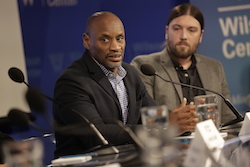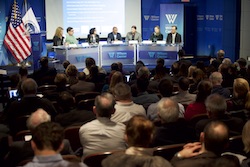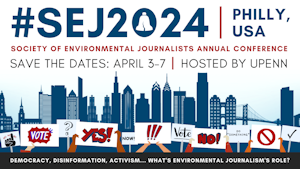SEJournal Online is the digital news magazine of the Society of Environmental Journalists. Learn more about SEJournal Online, including submission, subscription and advertising information.

SEJ News: Enviro, Energy Reporters Look at Prospects for Beat in 2017
By Joseph A. Davis
Bold, even “revolutionary” moves on environment and energy policy are at the center of the news outlook for 2017, but what will come of those initiatives remains murky, a panel of top journalists told a crowd of several hundred at the Washington, D.C. think tank Wilson Center on Feb. 3.
 |
| SEJ President Bobby Magill characterized Trump environmental policy as 'deregulate, deregulate, deregulate.' Photo: Schuyler Null/Wilson Center |
Bobby Magill, president of the Society of Environmental Journalists, which co-sponsored the annual Wilson Center look ahead, opened the event by suggesting that the Trump Era would bring “turbulent and possibly revolutionary times” to the energy and environment beats.
Said Magill: "This is the Trump administration's environmental policy in a nutshell — deregulate, deregulate, deregulate. Eviscerate EPA." (Listen to an audio clip below).
The SEJ president also warned that, amid Trump’s “war” on the press, journalists must do their jobs better, cutting through misinformation with more facts and better reporting. Magill cautioned, as did other speakers at the event, that with conditions ripe for dramatic change at federal level, journalists would have to face the challenges of reporting major developments occurring simultaneously.
The turmoil has started even before President Donald Trump’s nominees have been confirmed to head major agencies. Panelist Darryl Fears, environmental reporter for the Washington Post, said the effort to keep up with all the changes on the beat at his paper was like starting a marathon with a "hundred-meter dash."
The coming year is likely to witness attacks on the Clean Air Act and the Clean Water Act, not only by Trump, but by a Republican-controlled Congress, according to Magill. He added that some states would try to take up the slack with any such deregulation.
 |
| Panelists Washington Post reporter Darryl Fears (left) and Mongabay's Mike Gaworecki spoke of prospects for environmental news stories in the Trump administration. Photo: Schuyler Null/Wilson Center |
Another key point of contention will be the Clean Power Plan, the centerpiece of former President Barack Obama’s effort to reduce climate change. Even if Trump withdraws it, the regulatory change would take time to work out — and resolution will still depend on the outcome of a tangle of court cases, said Magill, who is a senior science writer at Climate Central.
The most important challenge to the Clean Power Plan is a lawsuit filed by some two dozen mainly Republican states. A leader of that challenge is none other than Oklahoma Attorney General Scott Pruitt — Trump’s nominee to lead the U.S. Environmental Protection Agency, which issued the plan.
“Will Pruitt as EPA administrator recuse himself?” Magill asked.
Outlooks on climate, water, federal lands, species
Year-ahead outlooks also came from a panel discussion by a group of prominent journalists, moderated by Monica Trauzzi, managing editor and host of E&E TV.
Seth Borenstein, a science writer for the Associated Press, for instance, said while Trump probably could not “cancel” the Paris Agreement on climate, as he had pledged, he could undermine it, ceding leadership to other countries. But working against the 190-plus countries that have signed on to the agreement, Borenstein said, could have fallout in other arenas of U.S. international relations (listen to an audio clip below).
Mike Gaworecki, a staff writer and editor for Mongabay, said China was "looking likely" to step up and fill the leadership gap left by the United States on climate change. China, he said, was "walking the talk" by putting the brakes on its historical emphasis on coal as an energy source.
 |
| An overflow crowd of 250 attended the Feb. 3 event, with nearly 200 more watching online. Photo: Dale Willman/SEJ |
There would also surely be some effort to undo Obama's controversial "Waters of the United States" rule, suggested Amena Saiyid, a water reporter for Bloomberg BNA. The rule tries to define which wetlands and non-navigable water the Clean Water Act applies to.
Saiyid said right now the Trump administration and Congress are each waiting for the other to take the initiative to scrap the rule. As far as water infrastructure like sewers and drinking water, she said Congress and the administration were likewise in a "stalemate situation.”
Meanwhile, Trump's nominee to head the Interior Department, Ryan Zinke, is the "least disliked" of the president's nominees to environmental agencies, said the Washington Post’s Fears. Zinke does not favor selling off federal lands or giving them to the states, for instance, as some Western Congress members do.
Fears added that Trump's mandate to sell more federal coal faced a weakening coal market. He also said to watch for moves afoot in the Senate to reopen Obama's delicate agreement on the sage grouse on Western lands (listen to an audio clip below). But whether Trump and the Republicans would try to water down the Endangered Species Act, Fears said, remains an open question.
Speculation on Pruitt, pipelines, science, ivory bans
Annie Snider, an energy and water reporter for Politico, speculated about EPA nominee Pruitt, suggesting the Senate was likely to ultimately confirm his nomination, but that conflict-of-issues would inevitably come up as he worked through top-tier issues on the Trump agenda (listen to an audio clip below). Pruitt has been a party in lawsuits not only on the Clean Power Plan, but also the Waters of the United States rule and EPA's rule on mercury pollution from coal-burning power plants.
 |
| The SEJ event also marked the opening of a photography exhibition by the late SEJ member Gary Braasch. The exhibit, "Climate Change in Our World," continues at the Wilson Center in Washington, D.C. until May 1, 2017. Photo: Joan Rothlein |
Democrats have complained that Pruitt could not simultaneously be "the plaintiff, the defendant, and the judge" on those cases, Snider said. But she also reminded the audience of Pruitt's statement that he would not automatically recuse himself, but would rather abide by the decision of EPA's ethics office.
John Siciliano, an energy and environmental reporter for the Washington Examiner, addressed the near-paralysis of the Federal Energy Regulatory Commission. For complicated reasons related to the Trump transition, FERC currently lacks a quorum. That threatens to stall, for at least a while, Trump's full-speed-ahead approach to energy pipelines.
"FERC has become incredibly, incredibly politicized in the last couple years," Siciliano said. The oil and gas industry, he added, is working hard to get a working FERC quickly. Environmentalists are opposing some of the pipelines.
One coming story often overlooked, the AP’s Borenstein said, was the role of the Office of Information and Regulatory Affairs, “where regulations went to die.” The Trump administration has not appointed a head of OIRA yet. Under George W. Bush, OIRA tilted cost-benefit analyses by devaluing the price of a human life.
Other key overlooked stories in the coming year, said Saiyid and other panelists, will be on scientific findings, the funding of science and the integrity of science.
Gaworecki also noted that China, a major market for elephant ivory, could take a step forward in the coming year on saving elephants if it keeps its recent pledge to close domestic markets for ivory by the end of 2017.
Video of the entire session at the Wilson Center can be found below, along with selected audio clips. You can also find a Powerpoint of Magill’s presentation of the “2017 Journalists’ Guide to Energy & Environment” here. SEJ has published a full online edition of the 2017 Journalists’ Guide. It contains a plethora of web links to key information sources reporters will need in the coming year.
| View a video webcast of the entire Wilson Center session. |
|
Audio clips from the event, featuring panelists Annie Snider of Politico, Darryl Fears of the Washington Post, Seth Borenstein of the Associated Press and Bobby Magill of Climate Central. CREDIT: Mike Gaworecki/Mongabay |
CORRECTION: An earlier version of a photo caption in this story incorrectly reported event attendance and online participation. Organizers estimate more than 250 people attended the event at the Wilson Center auditorium and an overflow room, while 186 unique viewers were recorded watching the livestream.
* From the weekly news magazine SEJournal Online, Vol. 2, No. 6. Content from each new issue of SEJournal Online is available to the public via the SEJournal Online main page. Subscribe to the e-newsletter here. And see past issues of the SEJournal archived here.
















